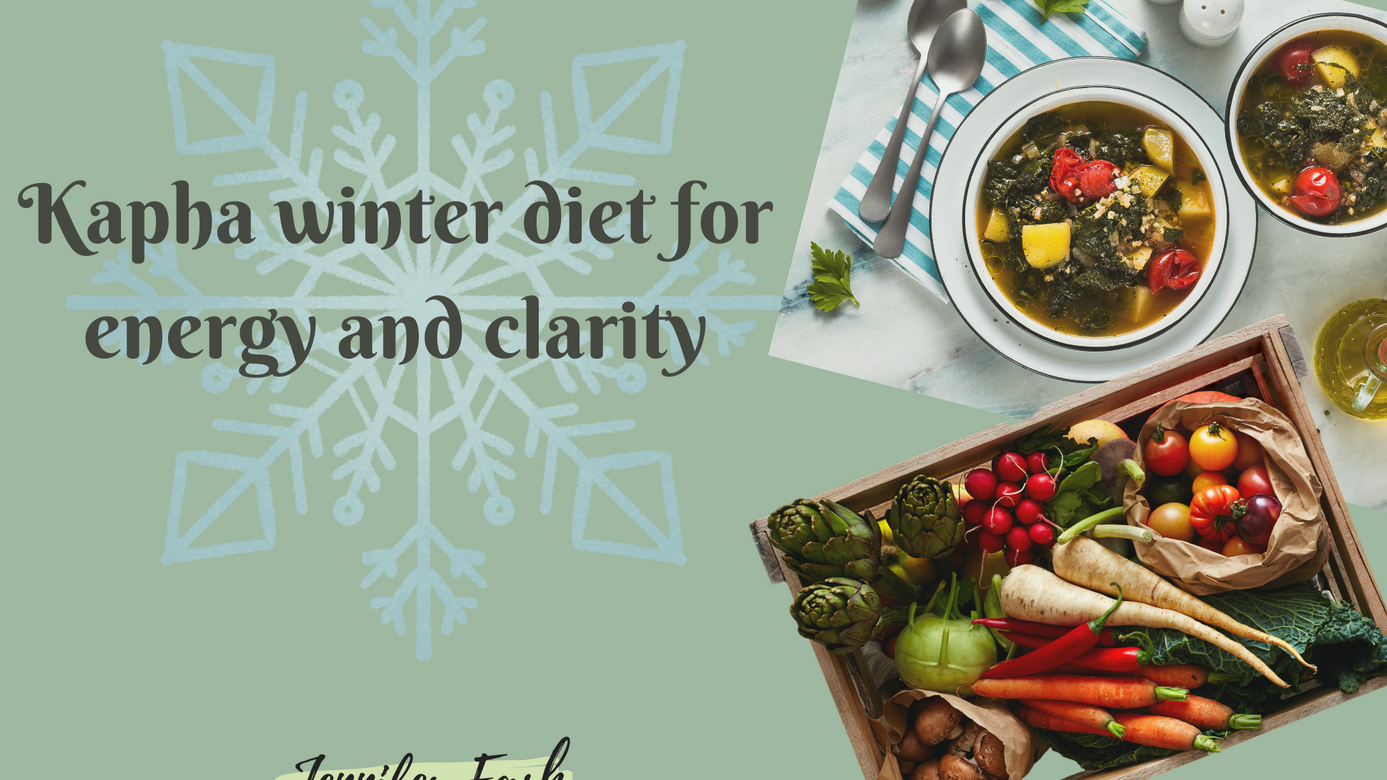Winter: A Time for Rest, But Also for Nourishment
We all know winter is the season of slowing down. Plants take a break, animals disappear into their dens, and the days grow short and dark. But what’s not so obvious is how to live—and eat—in a way that works with winter’s energy rather than against it. Because let’s face it: winter can feel heavy, cold, damp, and even a little oppressive at times. That’s where Ayurveda comes in. As yoga’s sister science of healing, Ayurveda has some truly helpful wisdom on how to eat in a way that keeps us balanced and healthy through these chilly months.

Winter & the Kapha Dosha: Finding Balance
In Ayurveda, winter’s energy matches up with kapha—one of the three doshas (or bio-energies) that govern our bodies. Kapha is all about cold, heaviness, moisture, and slowness. When it’s in balance, kapha gives us strength, stability, and endurance. But when winter rolls around, kapha can easily get out of balance. Too much of it leads to extra mucus, weight gain, low energy, and even feelings of sadness or sluggishness.
The good news? A few simple tweaks to your diet can help keep kapha steady and strong all winter long. Here’s how:

1. Stay Warm & Keep Your Digestive Fire Burning
Winter’s cold weather pushes agni—your inner digestive fire—deep into your core. When agni gets weak, it creates ama, or toxins, which Ayurveda says are the root of many health problems. So how do you keep agni strong?
- Avoid snacking between meals—it dulls your digestion.
- Skip cold, heavy, or overly oily foods—like raw salads, ice cream, fried dishes, or too many sweets. These make digestion sluggish and increase kapha.
- Drink warm liquids—hot water, herbal teas (ginger tea is perfect!), and warm soups help stoke your digestive fire.
- Eat warm, cooked, lightly spiced meals—think stews, roasted veggies, and grains with a little ghee or oil.
- Add fermented foods—yogurt, miso, sauerkraut, and cheese (in moderation) help warm the body.
- Use digestive spices—black pepper, cinnamon, ginger, fennel, and cardamom boost agni. Sprinkle them in teas or meals.
2. Build Strength & Nourish Your Body

A balanced kapha dosha keeps your joints flexible, your skin moist, and your immune system strong. Winter is actually the best time to give your body deep nourishment. Here’s how:
- Eat fresh, seasonal, easy-to-digest foods—organic veggies, ripe fruits, whole grains, and warm dairy like milk or yogurt (if your body tolerates it).
- Add ghee—it’s a great winter food that supports digestion and immunity.
- Boost protein intake—this helps repair muscles, strengthen immunity, and keep your skin healthy. Try nuts, seeds, eggs, yogurt, or protein powders if needed.
3. Lighten Up If You Feel Too Heavy

If winter is making you feel weighed down—whether from extra mucus, sluggishness, or low mood—it’s time to balance kapha with lighter, drier foods.
- Load up on fiber—it helps clear out heaviness and stagnation.
- Eat more cooked veggies and fruits—they’re easier to digest than raw ones in winter.
- Add drying foods—beans, potatoes, popcorn, barley, millet, and buckwheat help balance kapha’s oiliness.
4. Ground Yourself with Root Veggies & Squashes

Cold, dry, windy days don’t just increase kapha—they can also aggravate vata (the dosha linked to movement and air). If you’re feeling anxious, restless, or dealing with dry skin or poor sleep, you need grounding foods.
- Eat root vegetables—sweet potatoes, carrots, beets, and regular potatoes are hearty and stabilizing.
- Cook with healthy fats—olive oil, coconut oil, ghee, and butter help balance vata.
- Don’t skimp on omega-3s—they’re great for calming vata.
Final Tip: Listen to Your Body
These are general guidelines—not strict rules. Everyone’s body is different, so adjust based on how you feel. Pay attention to:
- Your energy levels
- Your digestion
- Your mood
Winter affects everyone differently. If something doesn’t work for you, tweak it! The key is to eat in a way that keeps you feeling strong, balanced, and well-nourished—no matter how cold it gets outside.
